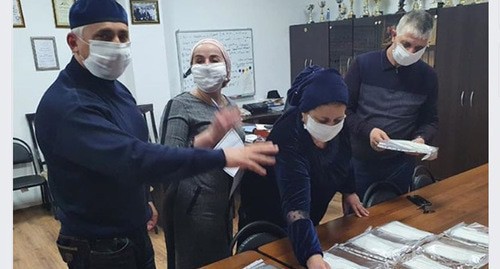
04 April 2020, 13:36
Pandemic actualizes tradition of mutual help in Northern Caucasus
The epidemic threat has brought to life the tradition of self-organization of the Caucasian society: people are actively helping each other to deal with the common problem, the residents interviewed by the "Caucasian Knot" have stated.
The Derbent sparkling wine factory has allocated money to ease the status of people who found themselves in a difficult economic situation due to coronavirus. "We decided to help people: many found themselves in a difficult situation; they may lose jobs and stay without food; not everyone can afford buying some medicines and foodstuffs. Now it's important to help our citizens," a factory employee named Magomed told the "Caucasian Knot".
In Dagestan, in the context of the coronavirus epidemic, the volunteer movement has intensified, Miyasat Muslimova, the vice-rector for scientific and methodological work of the Dagestani Institute for Education Development, has stated.
"Both people known for their wealth and the unknowns, from Suleiman Kerimov to minor entrepreneurs, help others. Yesterday I bought medical masks from a girl who, apart from selling, is sewing masks for charity distribution," Ms Muslimova told the "Caucasian Knot".
In Kabardino-Balkaria, entrepreneurs and volunteers are organizing help to low-income and disabled people, said Aslan Beshto, the chairman of the NGO named "Kabardian Congress".
"Businessmen have decided to contribute to equipping medics with personal protective means: anti-plague uniforms, overalls, respirators and disposable masks. I read messages in different Internet groups: for example, a young guy brings masks for distribution to people in one of the city's supermarkets, and a married couple bought 7 tons of potatoes for distribution among the poor and needy. There have been reports that some groceries offer free foodstuff packages to those in need. In another store, someone pays for all the bread sold there and offers those who need it to take it freely," Mr Beshto told the "Caucasian Knot" correspondent.
According to his story, in some cases, benefactors do not tell about their help to those in need. "There are other ways of humanitarian actions, about which benefactors wouldn't tell others – they just do it out of the kindness and breadth of their souls. Such actions were quite widely developed with us before; it's called 'psapa' – something made from one's soul," Aslan Beshto has added.
This article was originally published on the Russian page of 24/7 Internet agency ‘Caucasian Knot’ on April 3, 2020 at 11:58 pm MSK. To access the full text of the article, click here.
Author: Gor Aleksanyan Source: CK correspondent





Комментирование через Кавказский узел